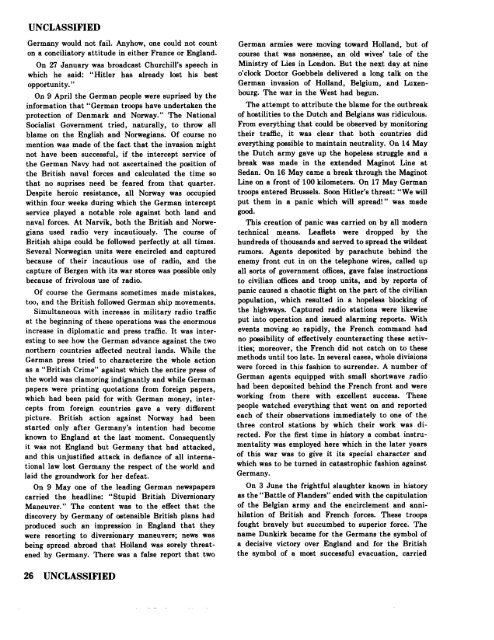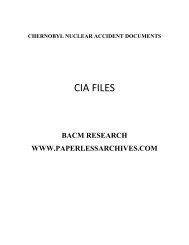national security agency journal articles world war ii german ...
national security agency journal articles world war ii german ...
national security agency journal articles world war ii german ...
Create successful ePaper yourself
Turn your PDF publications into a flip-book with our unique Google optimized e-Paper software.
UNCLASSIFIED<br />
Germany would not fail. Anyhow, one could not count<br />
on a conciliatory attitude in either France or England.<br />
On 'l:7 January was broadcast Churchill's speech in<br />
which he said: "Hitler has already lost his best<br />
opportunity."<br />
On 9 April the German people were suprised by the<br />
information that "German troops have undertaken the<br />
protection of Denmark and Norway." The National<br />
Socialist Government tried, naturally, to throw all<br />
blame on the English and Norwegians. Of course no<br />
mention was made of the fact that the invasion might<br />
not have been successful, if the intercept service of<br />
the German Navy had not ascertained the position of<br />
the British naval forces and calculated the time so<br />
that no suprises need be feared from that quarter.<br />
Despite heroic resistance, all Norway was occupied<br />
within four weeks during which the German intercept<br />
service played a notable role against both land and<br />
naval forces. At Narvik, both the British and Norwegians<br />
used radio very incautiously. The course of<br />
British ships could be followed perfectly at all times.<br />
Several Norwegian units were encircled and captured<br />
because of their incautious use of radio, and the<br />
capture of Bergen with its <strong>war</strong> stores was possible only<br />
because of frivolous use of radio.<br />
Of course the Germans sometimes made mistakes,<br />
too, and the British followed German ship movements.<br />
Simultaneous with increase in military radio traffic<br />
at the beginning of these operations was the enormous<br />
increase in diplomatic and press traffic. It was interesting<br />
to see how the German advance against the two<br />
northern countries affected neutral lands. While the<br />
German press tried to characterize the whole action<br />
as a "British Crime" against which the entire press of<br />
the <strong>world</strong> was clamoring indignantly and while German<br />
papers were printing quotations from foreign papers,<br />
which had been paid for with German money, intercepts<br />
from foreign countries gave a very different<br />
picture. British action against Norway had been<br />
started only after Germany's intention had become<br />
known to England at the last moment. Consequently<br />
it was not England but Germany that had attacked,<br />
and this unjustified attack in defiance of all inter<strong>national</strong><br />
law lost Germany the respect of the <strong>world</strong> and<br />
laid the groundwork for her defeat.<br />
On 9 May one of the leading German newspapers<br />
carried the headline: "Stupid British Diversionary<br />
Maneuver." The content was to the effect that the<br />
discovery by Germany of ostensible British plans had<br />
produced such an impression in England that they<br />
were resorting to diversionary maneuvers; news was<br />
being spread abroad that Holland was sorely threatened<br />
by Germany. There was a false report that two<br />
German armies were moving to<strong>war</strong>d Holland, but of<br />
course that was nonsense, an old wives' tale of the<br />
Ministry of Lies in London. But the next day at nine<br />
o'clock Doctor Goebbels delivered a long talk on the<br />
German invasion of Holland, Belgium, and Luxenbourg.<br />
The <strong>war</strong> in the West had begun.<br />
The attempt to attribute the blame for the outbreak<br />
of hostilities to the Dutch and Belgians was ridiculous.<br />
From everything that could be observed by monitoring<br />
their traffic, it was clear that both countries did<br />
everything possible to maintain neutrality. On 14 May<br />
the Dutch army gave up the hopeless struggle and a<br />
break was made in the extended Maginot Line at<br />
Sedan. On 16 May came a break through the Maginot<br />
Line on a front of 100 kilometers. On 17 May German<br />
troops entered Brussels. Soon Hitler's threat: "We will<br />
put them in a panic which will spread!" was made<br />
good.<br />
This creation of panic was carried on by all modern<br />
technical means. Leaflets were dropped by the<br />
hundreds of thousands and served to spread the wildest<br />
rumors. Agents deposited by parachute behind the<br />
enemy front cut in on the telephone wires, called up<br />
all sorts of government offices, gave false instructions<br />
to civilian offices and troop units, and by reports of<br />
panic caused a chaotic flight on the part of the civilian<br />
population, which resulted in a hopeless blocking of<br />
the highways. Captured radio stations were likewise<br />
put into operation and issued alarming reports. With<br />
events moving so rapidly, the French command had<br />
no possibility of effectively counteracting these activities;<br />
moreover, the French did not catch on to these<br />
methods until too late. In several cases, whole divisions<br />
were forced in this fashion to surrender. A number of<br />
German agents equipped with small shortwave radio<br />
had been deposited behind the French front and were<br />
working from there with excellent success. These<br />
people watched everything that went on and reported<br />
each of their observations immediately to one of the<br />
three control stations by which their work was directed.<br />
For the first time in history a combat instrumentality<br />
was employed here which in the later years<br />
of this <strong>war</strong> was to give it its special character and<br />
which was to be turned in catastrophic fashion against<br />
Germany.<br />
On 3 June the frightful slaughter known in history<br />
as the "Battle of Flanders" ended with the capitulation<br />
of the Belgian army and the encirclement and annihilation<br />
of British and French forces. These troops<br />
fought bravely but succumbed to superior force. The<br />
name Dunkirk became for the Germans the symbol of<br />
a decisive victory over England and for the British<br />
the symbol of a most successful evacuation, carried<br />
26 UNCLASSIFIED
















